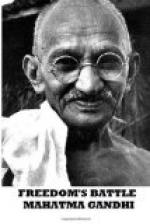to illustrate the meaning of horror and tyranny.
“In private complaints he never takes the statement
of the complainant. It is taken down by the reader
when the court rises and got signed by the magistrate
the following day. Whether the report received
(upon such complaints) is favourable to the complainant
or unfavourable to him, it is never ready by the magistrate,
and complaints are dismissed without proper trial.
This is the fate of private complaints. Now as
regards police chellans. Pleaders for the accused
are not allowed to interview under trial prisoners
in police custody. They are not allowed to cross-examine
prosecution witnesses.... Prosecution witnesses
are examined with leading questions.... Thus a
whole prosecution story is put into the mouth of police,
witnesses for the defence though called in are not
allowed to be examined by the defence counsel....
The accused is silenced if he picks up courage to
say anything in defence.... Any Cantonment servant
can write down the name of any citizen of the Cantonment
on a chit of paper and ask him to appear the next
day in court. This is a summons.... If any
one does not appear in court who is thus ordered,
criminal warrants of arrest are issued against him.”
There is much more of this style in the letter which
is worth producing, but I have given enough to illustrate
the writer’s meaning. Let me turn for a
while to this official’s record during Martial
Law. He is the official who tried people in batches
and convicted them after a farcical trial. Witnesses
have deposed to his having assembled people, having
asked them to give false evidence, having removed
women’s veils, called them ‘flies, bitches,
she-asses’ and having spat upon them. He
it was who subjected the innocent pleaders of Shokhupura
indescribable persecution. Mr. Andrews personally
investigated complaints against this official and came
to the conclusion that no official had behaved worse
than Mr. Smith. He gathered the people of Shokhupura,
humiliated them in a variety of ways, called them
‘suvarlog,’ ‘gandi mukkhi.’
His evidence before the Hunter Commission betrays
his total disregard for truth and this is the officer
who, if the correspondent in question has given correct
facts, has been promoted. The question however
is why, he is at all in Government service and why
he has not been tried for assaulting and abusing innocent
men and women.
I notice a desire for the impeachment of General Dyer and Sir Michael O’Dwyer. I will not stop to examine whether the course is feasible. I was sorry to find Mr. Shastriar joining this cry for the prosecution of General Dyer. If the English people will willingly do so, I would welcome such prosecution as a sign of their strong disapproval of the Jallianwalla Bagh atrocity, but I would certainly not spend a single farthing in a vain pursuit after the conviction of this man. Surely the public has received sufficient experience of the English mind. Practically the whole English Press has joined the




